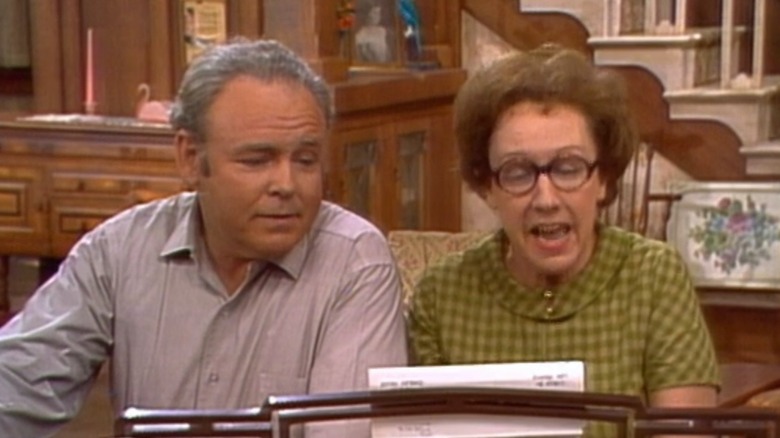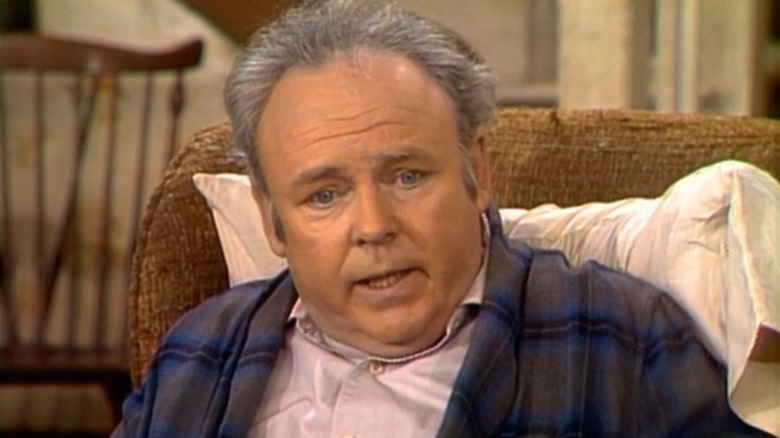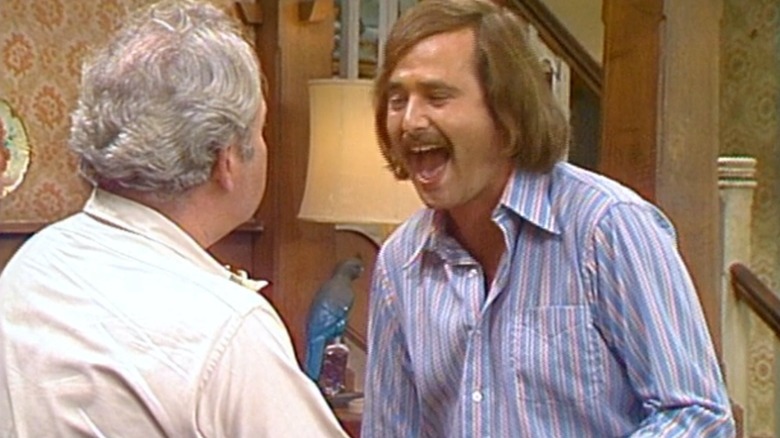The Casting Decisions That Finally Got All In The Family Off The Ground
Before "All in the Family" became one of the most groundbreaking sitcoms of all time, it was a non-starter with two failed pilot episodes and counting. The first, titled "Justice For All," was taped 3 years before the original show's run and featured a cast including Carol O'Conner and Jean Stapleton, who would go on to play married couple Archie and Edith Bunker in the final version of the show. The actors playing the Bunker family's daughter Edith and son-in-law Michael were different, though, played by Kelly Jean Peters ("Cagney & Lacey") and Tim McIntire ("Soap"), whose character was initially named Richard.
O'Conner explained in his memoir "I Think I'm Outta Here" that he largely rewrote the original pilot script himself, and the pilot was recorded in New York in October 1968. According to a TIME Magazine 50th anniversary retrospective by Daniel S. Levy, network execs weren't pleased with the casting choices for the younger members of the Bunker clan, and asked for a second pilot to be shot using the same script. This time around, the show was titled "Those Were The Days," and Candice Azzara ("Catch Me If You Can") and small screen newcomer Chip Oliver played the younger characters. This, too, didn't work, and it wasn't until CBS got a new president who offered series creator Norman Lear a 13-week season 1 commitment that the show we know as "All in the Family" was born.
'The gods wanted me to come across Rob Reiner and Sally Struthers'
In a retrospective interview Lear gave Entertainment Weekly in 2021, he attributed the show's breakthrough to a simple casting change. "The gods wanted me to come across Rob Reiner and Sally Struthers," Lear said, referencing the actors who would ultimately come to embody Archie and Edith's feminist, college-age daughter Gloria and her countercultural husband, Michael "Meathead" Stivic. According to Lear, "The first pilot we made was terrific, and it was word-for-word the same as the second and third pilot. I had Carroll O'Connor and Jean Stapleton, but I had different young people."
The influential filmmaker said it was a good thing neither "Justice For All" nor "Those Were The Days" worked out, as "All in the Family" connected best with the final iteration of its cast. "It was the third time we were asked to make it that I cast Rob Reiner and Sally Struthers, and bless the fact that nobody picked up the show before we found them. Because the chemistry of those four people in every direction was magic," he explained to EW. After nine seasons of "All in the Family," Reiner would go on to direct movies like "Stand By Me," "When Harry Met Sally..." and "The Princess Bride." Struthers, meanwhile, would take on several more iconic TV roles in shows like "9 to 5," "Gilmore Girls," and "Dinosaurs."
'Norm, they are going to kill you.'
At the time, though, the pair were up-and-coming stars who gave the blisteringly honest TV show the chemistry it needed. "All in the Family" was – and still remains – a famously controversial sitcom thanks to its taboo-busting portrayal of a racist, sexist, and otherwise reactionary patriarch, but it was also a wildly popular one. Years before Lear spoke about Reiner and Struthers as the key to unlocking the show, he also admitted that executives were anxious about the idea of putting such a messy, wrong-headed character on TV in the midst of a period of political unrest. "Norm, they are going to kill you. They are going to shoot you in the streets," actor Mickey Rooney once told Lear after being offered the role of Archie (per TIME).
As Lear told the story, ABC executives shelved the idea between pilots two and three — despite having reportedly spent $250,000 on the project — due to a fear of backlash. "It wasn't a question of whether it was funny or not," Lear once told People (per Yahoo). "They peed in their pants. But they were afraid." By 1972, a network was ready to take the risk, and it paid off: "All in the Family" remains one of the most influential TV shows of all time, lauded for its bold and outspoken take on social issues — and for its dynamic comedic cast.


